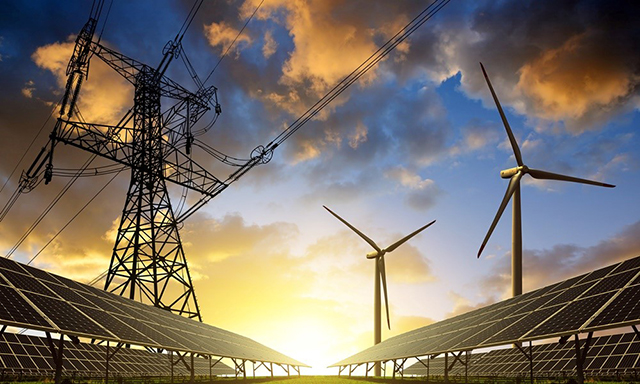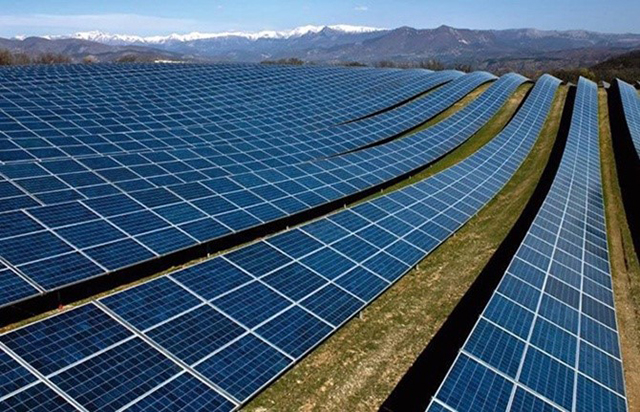
Serhat Cecen, chairman of ELDER, announced that action plans are ready to provide uninterrupted electricity to citizens in the event of a possible crisis due to the global pandemic coronavirus (Covid-19).
Cecen said that a series of measures taken by electricity distribution companies to reduce the effects of the Corona Virus. Cecen reminded that all public institutions and organizations have taken strict measures since the beginning of the process. He said that, some measures to provide uninterrupted power in general and the 21 electricity distribution companies throughout Turkey since the first day he said urgently implemented.
He said that: “We have taken all our precautions to be prepared for the Kovid-19 virus, which is spread around the world and threatens our country. In the first place, we postponed all meetings and trainings until the end of April as a sector. We posted and informed 14 Rule posters to our service buildings and service points that prepared by the Ministry of Health. We will continue our understanding of providing uninterrupted and high-quality electricity to our citizens without risking any of our employees with the awareness that we are in the service industry. It is important for our consumers to choose online channels for subscription or invoicing processes and to minimize social contact in this process.
Action Plan for Uninterrupted Power Supply
Cecen stated that they have created an action plan for the continuity of the energy supply, and also announced that they have ensured the establishment of the systematic of teams and equipment for intervention in malfunctions during the epidemic. Cecen said that, "We have identified our limited and wide-impact scenarios and talked over our business recovery processes"
International Travels Are Stopped
Cecen, who listed the measures they took for the employees said that:
We stopped the international travel and started the 14-day quarantine application for all traveling staff. We raised our consumer units to work by masks and gloves. Single use services were started in dining halls and mealtimes were extended to prevent congestion. Apart from our field staff, infrastructure preparations have been started for our employees to work from home.
We installed thermal cameras at the company entrances of some of our Head Office and Regional Directorate units. We aim to provide control of both our citizens and employees by this coordinating. Their security is more valuable for us than anything else.”
Our Employees Were Informed
Cecen said that: We have taken additional measures for personnel in the high-risk group (pregnant, chronic diseases (diabetes-blood pressure-heart patients, etc.), cancer, liver, kidney failure, lung patients, etc.)
Workplace physicians held informative seminars for employees on ways to protect against corona virus in the locations except small districts. Contractors were sent information about the corona virus. Employees were asked to inform their companies in case of a suspicious case.
Regular announcements were made to our employees, both privately and throughout our companies. Measures such as travel, personal hygiene and an e-mail address were announced, for report a suspicious case about them or their family members. Intervention plans are prepared that include actions to be taken in case of suspicious cases in our employees or one of our employees' family members or contractor company staff.
Service Places Are Disinfected
Serhat Cecen said that all entrances and exits are regularly disinfected in the service units within the scope of the measures taken by the electricity distribution sector against the Kovid-19 virus. He said that, “Electricity distribution companies in Turkey, installed hand disinfectant units for entrances and exits and all floors. Employees are regularly informed about antivirus methods through internal communication. Elevators are cleaned 3 times a day by disinfectant. All common company vehicles were disinfected and disinfectant placed in the vehicles. Drivers disinfect when they pick up and deliver the vehicle.”

Turkey's 3rd drill ship named Kanuni arrived in Tasucu, Mersin, a coastal city in the Mediterranean region of the country on Sunday, Turkey's Energy and Natural Resources Minister Fatih Donmez announced.
Donmez said that Turkish Petroleum Corporation took the ship into its envantory on January, 31.
The preparations for the voyage of the ship were completed in the United Kingdom and the ship departed from the country.
"We named our 3rd drill ship Kanuni. After 18 days of voyage, our ship entered Turkey's Mediterranean coastal waters on March, 13. Kanuni arrived Tasucu, Mersin this morning," he noted.
The drill ship, with the ability to extend down to depths of 11,400 meters and drill to depths of 3,000 meters, was built by Samsung in South Korea in 2012. Brazilian energy company Petrobras used it for explorations up to 2015.
Donmez stated that the entry to and exit from the ship will be forbidden as part of measures against the global pandemic, Covid-19.
"The ship arrived in Turkey with 35 personnel of Turkish Petroleum Corporation. After the relevant process with the Covid-19 measures was completed, the process for maintenance, update and development will start for Kanuni," he said.
"The ship will start drilling as soon as it is ready," Donmez stated.
Turkey is currently exploring in the Eastern Mediterranean with two drilling vessels Fatih and Yavuz, along with Oruc Reis and Barbaros Hayrettin Pasa seismic vessels in the same region.
The country plans to conduct five offshore drillings in the Eastern Mediterranean this year, according to Turkey's Annual Presidential Program for 2020.
Turkey also plans to explore in the Black Sea region where work has been suspended for a long while.
Source: AA

IRENA Director-General Francesco La Camera expressed his feelings toward the current market situation noting that the oil market volatility is unlikely to have a significant impact on renewable energy plans and investments.
“Oil plays a negligible role in power generation and therefore does not compete with renewables in this respect. Renewables have become the dominant source of new power generation capacity over the last six years because they are competitive at the bottom end of the conventional fossil fuel power generation cost range – primarily with coal,” La Camera said.
He added: “Oil plays a much more important role in the transport sector, which accounts for half of total demand, and where without low-emission transport policies in place, an extended period of low oil prices, may impact the speed of electric vehicle adoption.
“Conversely, oil price volatility may undermine the viability of unconventional oil and gas resources as well as long-term contracts, providing a window of opportunity to reduce or redirect fossil fuel subsidies towards clean energy, while minimizing the potential of social disruption.
“Data from the previous oil price crash in 2014 shows no evidence of a link between the two. On the contrary, renewables investment reached new heights in both 2014 and 2015. The severity and duration of the impacts this time remains to be seen.”
Stressing the current COVID-19 situation, La Camera said: “The outbreak of COVID-19 threatens global supply chains in many sectors and is therefore likely to have an impact on renewable energy. The severity and duration of both situations remain [to be] seen.
“What is critical to understand, is that the long-term planning horizons involved, and the momentum that currently exists in the energy transformation, means neither low oil prices nor COVID-19 will interrupt or change our path towards decarbonisation of our societies and towards the achievement of the sustainable development goals.”
Source: Power Engineering International

Pacific Gas & Electric (PG&E) has won court approval to raise $23 billion to help pay its bills over destructive California wildfires, after governor Gavin Newsom dropped his opposition to a financing package designed to help the nation’s largest utility get out of bankruptcy.
The milestone reached during an unusual court hearing held by phone moves PG&E closer to its goal of emerging from one of the most complex bankruptcy cases in U.S. history by June 30.
Newsom has said he fears P&E is taking on too much debt to be able to afford an estimated $40 billion in equipment upgrades needed to reduce the chances of its electricity grid igniting destructive wildfires in the future.
The utility’s outdated system triggered a series of catastrophic wildfires in 2017 and 2018 that killed so many people and burned so many homes and businesses that the company had to file for bankruptcy early last year.
But the recent volatility in the financial markets caused by the coronavirus pandemic apparently softened Newsom’s stance after PG&E lined up commitments from investors promising to buy up to $12 billion in company stock.
Those guarantees are looming larger, given the turmoil that has caused the benchmark Standard & Poor’s 500 index to plunge by roughly 25% during the past three weeks. Because of the company’s already shaky condition, PG&E’s stock has been hit even harder, with shares losing nearly half their value during the same stretch. The stock fell 12% Monday to close at $8.95, its lowest price since early December.
Given the potential for upheaval in the financial markets to persist, PG&E lawyer Paul Zumbro told U.S. Bankruptcy Judge Dennis Montali that the commitments are “critically important.” A representative for Newsom said the governor agreed.
“People often talk tough when there is a level playing field, but in circumstances, almost all people want to make deal,” said Eric Snyder, a bankruptcy lawyer who has been following PG&E’s case.
Newsom has unusual leverage over PG&E because the company also needs state approval of its bankruptcy plan to qualify for coverage from a wildfire insurance fund that California created last summer.
In a statement, PG&E said it’s making “good progress” in discussions with Newsom. The governor’s office didn’t immediately respond to requests for comment about Newsom’s change of heart on PG&E’s financing package or other aspects of his talks with the company.
Source: Smart Energy International

The coronavirus pandemic has prompted major selloffs in global markets, but demand for renewable energy investments remains strong, said German asset management firm aream in a press release.
"We are observing an enormously increased demand," said CEO Markus W. Voigt. The company specialises in investments in renewable energy infrastructure with a focus on wind and solar. Voigt said one advantage of renewable energy investments is that their value is not correlated with other investments that might be losing value right now. "The obvious advantage is that renewables do not correlate with other asset classes," Voigt said, adding they provided regular revenues, "which is particularly important for offsetting falling equity profits."
Voigt noted that renewable energy producers in Germany are somewhat insulated from the impact of quarantines related to the coronavirus pandemic, since they are generally considered critical infrastructure providers and allowed to keep operating. Aream says demand is highest for diversified portfolios with a mix of different energy sources, locations and purchase agreements, as the best hedge against disruptions caused by the coronavirus.
Source: Clean Energy Wire

Italy’s electricity consumption dropped in the past week, a first sign of the deep economic impact of the national lockdown imposed to halt the spread of the coronavirus.
Factories and shops are shuttered across the country, including fashion designer Armani’s restaurants and hotels, and Ferrari NV and Lamborghini’s car production.
While daily calculations show a 5% drop in electricity on the Terna SpA network in the week through March 15, the grid operator estimates final figures will show the slump is actually about 10%.
The data is a harbinger of more bad news as the shutdown has likely dragged Italy into another recession. It’s a story that could be repeated across the world as country after country impose their own controls in response to the virus.
The number of cases of the disease has risen to about 200,000 globally, and Europe’s total has even surpassed China’s.
Italy is the worst hit in Europe, with more than 31,000 cases. The euro area’s third-biggest economy grew just 0.2 percent in 2019 and wasn’t expected to do much better this year, even before the outbreak.
Now that it is one of the epicenters of the disease, a deep slump is inevitable. Morgan Stanley sees GDP dropping 19% this quarter on an annualized basis, and by 33% in the next three months. The government has passed a 25 billion euro ($27 billion) spending plan to try to counteract some of the impact.
Source: Bloomberg
Mapping and Analyzing the Possible Impact of COVID-19
COVID-19 (coronavirus) is having rippling, negative impacts on the global economy and the U.S. will face headwinds in 2020 as a result. COVID-19’s impacts are most acute in China, which represents 16 percent of the global economy; China spent nearly 7 weeks with severely reduced economic activity, the effects of which are just beginning to show in the economic data. The U.S. and other countries are taking measures to reduce COVID-19’s impact via a combination of precautionary health related measures, eased monetary, and in some countries, fiscal assistance. World Bank research suggests the greatest economic impact comes from firms and households engaging in “aversion behavior” that reduces economic activity.
Please click here to read the full report.

